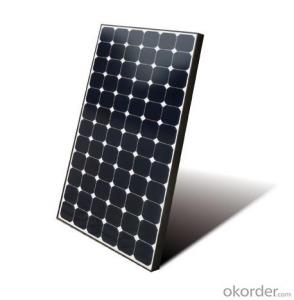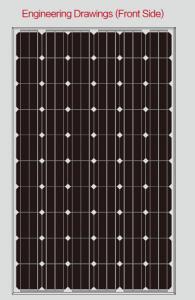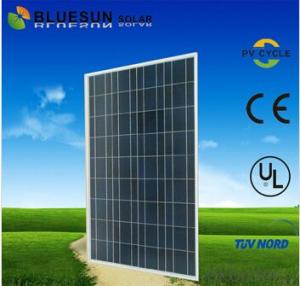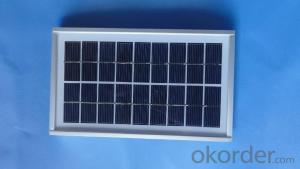Poly Solar Panel 270W A Grade with Cheapest Price
- Loading Port:
- Shanghai
- Payment Terms:
- TT OR LC
- Min Order Qty:
- 100 watt
- Supply Capability:
- 50000 watt/month
OKorder Service Pledge
OKorder Financial Service
You Might Also Like
Item specifice
Poly Solar Panel 270W A Grade with Cheapest Price
Product description
60 cell multi-crystalline solar module. 40mm natural anodised frame. IP65 rated Jbox, 1m solar cable and a pair of MC4 connectors.TÜV SÜD,SABS ISO 9001:2008 certified.
Nominal voltage refers to the voltage of the battery that the module is best suited to charge; this is a leftover term from the days when solar modules were only used to charge batteries. The actual voltage output of the module changes as lighting, temperature and load conditions change, so there is never one specific voltage at which the module operates. Nominal voltage allows users, at a glance, to make sure the module is compatible with a given system.
Open circuit voltage or VOC is the maximum voltage that the module can produce when not connected to an electrical circuit or system. VOC can be measured with a meter directly on an illuminated module's terminals or on its disconnected cable.
The largest challenge of photovoltaic technology is the efficiencies of such solar systems. While utilizing such systems draws a great interest due to the long term returns of profit, the efficacy needs to come a long way before making it plausible to be introduced in all consumers of electricity.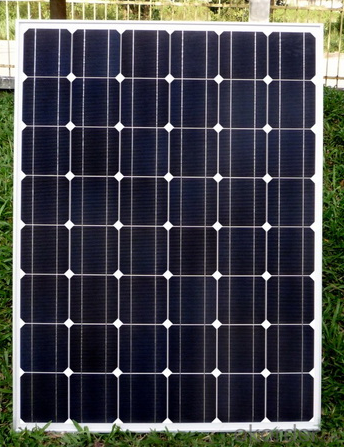
Application
Industrial
Commercial
Residential
Product feather
solar panel refers to a panel designed to absorb the sun's rays as a source of energy for generating electricity or heating.
A photovoltaic (in short PV) module is a packaged, connected assembly of typically 6×10 solar cells. Solar Photovoltaic panels constitute the solar array of a photovoltaic system that generates and supplies solar electricityin commercial and residential applications. Each module is rated by its DC output power under standard test conditions, and typically ranges from 100 to 365 watts. The efficiency of a module determines the area of a module given the same rated output – an 8% efficient 230 watt module will have twice the area of a 16% efficient 230 watt module. There are a few solar panels available that are exceeding 19% efficiency. A single solar module can produce only a limited amount of power; most installations contain multiple modules. A photovoltaic system typically includes a panel or an array of solar modules, a solar inverter, and sometimes a battery and/or solar tracker and interconnection wiring.
Packaging
24-26pcs into carton 312pcs for 20 foot container 712pcs for 40 foot container.
- Q:Can solar panels be used for powering Wi-Fi networks?
- Yes, solar panels can be used to power Wi-Fi networks. Solar panels convert sunlight into electricity, which can then be used to power various devices, including Wi-Fi routers. This allows for the establishment of Wi-Fi networks in remote locations or areas with limited access to electricity grids. Additionally, solar-powered Wi-Fi networks are environmentally friendly and sustainable.
- Q:Can solar panels be installed on a hotel or hospitality establishment?
- Yes, solar panels can definitely be installed on a hotel or hospitality establishment. In fact, many hotels and resorts are increasingly adopting solar energy systems to reduce their carbon footprint, lower energy costs, and demonstrate their commitment to sustainability. Solar panels can be installed on rooftops, carports, or even as ground-mounted arrays, providing clean and renewable energy to power various operations within the establishment.
- Q:I am researching several solar panels to install in my house. I would like to use a 40 watt panel to connect, through a solar battery controller, to a battery or two. I would then like to use the solar panel (40 watts) to charge the battery(ies) for emergency use. Once charged, and when needed, I would like to use the battery(ies), 2 volt deep cycle, to power several LED lamps. Since I am new to solar power I had several questions...Is a 40 watt panel strong/large enough to charge a 2 volt deep cycle battery or two?How long would it take to charge one of these batteries?What would be the expected cost to purchase necessary supplies? (With the solar panel, battery controller, and MC4 cabling I've found I have an expected cost of roughly $00.00 with batteries)Would this be difficult for someone with little experience in this field?
- Whats the size of battery ? The time needed for your 40Watts panel to fully charge a battery depends on the size of battery. Usually battery size is mentioned in Amp-Hours (AH).
- Q:I've been looking into solar panels. They are fairly expensive ($35k or so). My state has some rebates and grants available. Is anyone aware of any federal grants and rebates other than the federal tax credit? We are subject to AMT tax and can't take the credit. (Which is ridiculous, is the federal government committed to conservation or aren't they??????)
- Check out what someone did in Oakley, California - Contra Costa Times 22 June 2007 Going Solar Can Pay Off On The Long Run PGE Electric Power Monthly Bill Before Solar = $,200. Home: 2,900 sq. ft. Installation Cost for 6.7 Kilowatt 36-solar cells $46,000 (minus $7,60 State rebate). New Resources Bank, a “green” bank in San Francisco, lend them a, no-fee, no-points, second mortgage at $200 a month less than their previous monthly payments because of their plan to install solar panels. PGE Current Electricity Monthly Bill After Solar = $7.63 after deductions for any excess power produced by solar cell which PGE.is legally required to buy. PGE has not build any new electric power plants in California for years and their profits do not depend on sales volume, Sen. Feinstein introduced a bill to make this a National Law. Poweful interests are against this, perhaps they are foreign companies that hate Americans? Surely, they are not bona fide, red blooded Americans that love all the people in the U. S. of America, you think?
- Q:I'm looking for some advice on hot water solar panels. I'm trying to save some money on electricity. A neighbor has been suggesting solar powered equipment for some time now, and I think he's right. It does save quite a bit of money in the long run. They're kind of expensive though, so I'm looking for cheaper alternatives.
- If you are just looking for hot water, you can build your own water pre-heater with copper tubing, mirrors, black engine paint, wood for an enclosure, and glass to cover the enclosure. I have seen plans online but cannot recall just now where. I've included some links below that you might want to check out. Also, you may want to check on tax rebates in your area for using solar. In some areas you can get rebates to pay nearly 00% of the cost. Or search for how to build a solar water heater for a LOT of online sites. One caution, do NOT use water directly from a solar water heater as it can be hot enough to burn your skin.
- Q:I'm writing a post-apocalyptic story in it the main character finds a warehouse. Eventually he finds out the roof is covered with commercial solar panels. Given it's been over a year since the majority of the world died no manainence was done, do they still work?
- In my experience working with solar panels, I've found that the panels themselves are robust and can last years. How that energy is transferred from the panel to perform work (sorry for the boffinism) is where the complexity emerges, namely due to the fact solar panels produce DC current, and nearly all of our electrical appliances use AC current. In most cases, solar panels will either send energy through a DC/AC inverter directly to be used for appliances, or stored in deep cycle batteries, then converted to AC using an inverter when the user wants to use his/her appliance. Now to answer your question: the solar panels will be fine, and could conceivably be in fine working order with AC current available IF... and I cannot stress this enough (namely through years of field experience dealing with solar powered scientific instrumentation that was working well and then mysteriously not working)... IF rats and other rodents haven't eaten through the wires. This is probably the most likely reason that a set of solar panels wouldn't be working in your given scenario. Hope this helps, and good luck!!
- Q:Can solar panels be installed on schools or educational campuses?
- Yes, solar panels can be installed on schools or educational campuses. In fact, many educational institutions are increasingly adopting solar energy systems as a sustainable and cost-effective solution for their power needs. Installing solar panels on schools not only helps reduce carbon emissions and reliance on fossil fuels, but also provides educational opportunities for students to learn about renewable energy and its benefits. It can also lower electricity bills and redirect saved funds towards educational programs.
- Q:Can solar panels work at night?
- No, solar panels do not work at night as they rely on sunlight to generate electricity.
- Q:Can solar panels be used in areas with high levels of bird or bat activity?
- Yes, solar panels can be used in areas with high levels of bird or bat activity. However, it is important to take certain precautions to minimize the potential risks to birds and bats. These precautions may include using specific panel designs that reduce the chances of bird or bat collisions, implementing bird or bat deterrent measures, and considering the placement of the panels in areas away from known flight paths or nesting sites. By implementing these measures, solar panels can coexist with bird and bat populations while helping to generate clean, renewable energy.
- Q:Can solar panels be installed on a community center or social gathering place?
- Yes, solar panels can be installed on a community center or social gathering place. Solar panels are versatile and can be installed on various types of buildings, including community centers, to harness solar energy and reduce dependence on traditional energy sources. This can help make the community center more sustainable, reduce its carbon footprint, and potentially save on energy costs.
1. Manufacturer Overview |
|
|---|---|
| Location | |
| Year Established | |
| Annual Output Value | |
| Main Markets | |
| Company Certifications | |
2. Manufacturer Certificates |
|
|---|---|
| a) Certification Name | |
| Range | |
| Reference | |
| Validity Period | |
3. Manufacturer Capability |
|
|---|---|
| a)Trade Capacity | |
| Nearest Port | |
| Export Percentage | |
| No.of Employees in Trade Department | |
| Language Spoken: | |
| b)Factory Information | |
| Factory Size: | |
| No. of Production Lines | |
| Contract Manufacturing | |
| Product Price Range | |
Send your message to us
Poly Solar Panel 270W A Grade with Cheapest Price
- Loading Port:
- Shanghai
- Payment Terms:
- TT OR LC
- Min Order Qty:
- 100 watt
- Supply Capability:
- 50000 watt/month
OKorder Service Pledge
OKorder Financial Service
Similar products
New products
Hot products
Hot Searches
Related keywords
